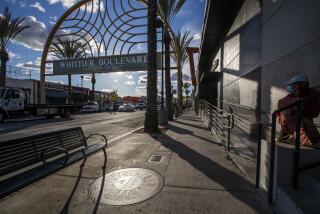Taking Politics to the Streets
- Share via
From sending campaign workers into the streets to fighting City Hall, politics is how things get done in the predominantly black, poor-to-middle-class community known as South-Central Los Angeles.
That is not well understood by strangers to South-Central, whose views are formed by television and newspaper coverage of cops, drive-by shootings, gangs and crack. Those outside South-Central L.A. don’t see the forces within the community that are working through politics for its preservation.
Something happened recently that showed me the connection between skilled grass-roots politics and fighting drug dealers and violence. My instruction began when I met Charles Battle, who operates a youth center in the neighborhood. Battle is one of the leaders of an effort to stop construction of another South-Central swap meet, which many residents complain serve as shopping malls for cash-rich crack dealers.
Battle had walked into The Times office at City Hall one morning this month. He introduced himself as chairman of the People Who Care Youth Center on West Slauson Avenue and asked me if the paper was going to cover a Planning Department hearing on the swap meet. Probably not, I told him. It sounded like a neighborhood beef, and we don’t cover too many of those. Anyway, I wondered, what’s wrong with a swap meet?
On an impulse, I went. More than 40 people were in the hearing room, most of them residents of West 58th Street, middle-aged men and women and older, looking serious and worried. They were appealing a permit that the Planning Department had given to property owner Arnold Shugar, who wanted to convert a former beer warehouse on West 58th Street into a retail operation, “The Treasure Island Fashion Center.”
Larry Wiggs, a City Hall lobbyist representing Shugar, said the fashion center would be a legitimate business, not some fly-by-night swap meet, and would stimulate the economy of a neighborhood that needed such help.
But as the residents explained it, “Treasure Island Fashion Center” would rip apart a stable neighborhood. The following Saturday, I visited the street and saw what they meant.
The street has a long tradition of stability, representing an important part of Los Angeles history. It’s a street of the small, wooden homes known as California bungalows, built about 75 years ago for an earlier generation of seekers of the home-and-yard dream.
Battle introduced me to Evelyn Brown, who has owned a home on the street since 1975, and Elsie Ross, a 20-year homeowner. They explained what was wrong with “Treasure Island Fashion Center.” The name, they said, was misleading. It would be just another one of the swap meets springing up all through South-Central. In fact, there’s already a big one near West 58th Street, on Slauson.
These are not swap meets in the traditional sense. They are permanent retail establishments where clothing, luggage, jewelry, small appliances, tapes and CDs and food are sold from side-by-side booths.
These places, residents told me, are favorite shopping places for crack dealers, who feel they can spend large amounts of cash without attracting attention. West 58th Street, they feared, would become a crack dealers’ hangout.
But the permit had been issued. If the Treasure Island Fashion Center were to be stopped, the residents themselves would have to do it through grass roots political action.
Evelyn Brown is president and Elsie Ross is secretary of the 58th Street Neighborhood Watch Club, one of many such block clubs South Central. These clubs, often created through the Police Department’s Neighborhood Watch program, are an important part of the sector’s political structure. On West 58th Street, where many families have owned their homes for a quarter of a century or more, the block club is strong.
The club helped rally the neighborhood. An important ally was Bob Gay, a City Hall power because of his job as chief aide to City Councilman Gilbert Lindsay. Gay is a leader of the Inner City Christian Center, located nearby. The nearby Catholic church joined.
The councilman representing the district, Robert Farrell, joined the opposition. Planning Department Examiner Michael Davies recommended against it.
When two busloads of neighborhood residents came to City Hall for a Planning Commission meeting last week, they learned they had won. Although delaying a decision until March 1 to give Shugar’s new lawyer a chance to study the case, a majority of the commission said they will vote no.
I wasn’t surprised. Some people consider politics a dirty word. But without politics, as expressed through the fabric of South-Central’s community and religious organizations, West 58th Street would be a dangerous place.
More to Read
Get the L.A. Times Politics newsletter
Deeply reported insights into legislation, politics and policy from Sacramento, Washington and beyond. In your inbox twice per week.
You may occasionally receive promotional content from the Los Angeles Times.







